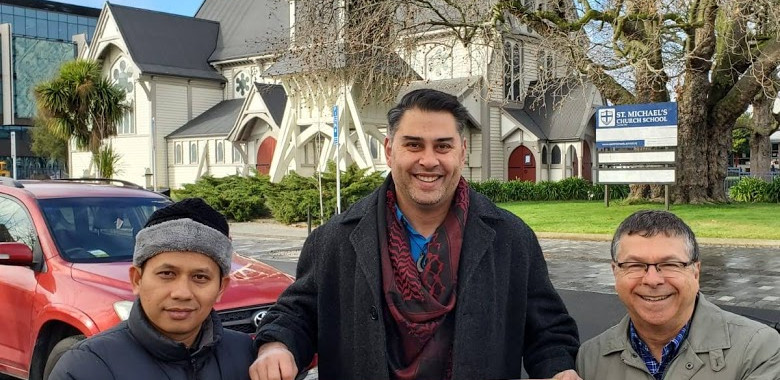Circle 1: Genesis
- 1000 Abrahamic Circles

- Jul 30, 2019
- 3 min read
Updated: Jan 16, 2025
30/07/2019 - 23/08/2019

Members

Rabbi Eliot Baskin
Associate Rabbi at Temple Emanuel Denver, Colorado, USA

Reverend Ryhan Prasad
Minister at Khandallah Presbyterian Church, Wellington, New Zealand

Ustadz Oji Fahruroji
Ustad at JAGAT ARSY World Civilization Boarding School,
Tangerang City, Banten, Indonesia
Project Report
Conclusion of the Journey
The pilot circle of the 1000 Abrahamic Circles “Genesis” was rather a successful first attempt. Each circle member was able to demonstrate a very good participation and cooperation in complying with the 1000 Abrahamic Circle’s program. As the circle members faced some changes, from being part of the majority then becoming a minority and meeting new people with different worldviews, they were able to built ties together as shown through their close friendship at the end of the journey. During the journey, circle members were able to witness the prayer service and the everyday life of the other two Abrahamic religions, creating a safe space for an open dialogue and thus establishing mutual respect.
It is shown from their public discourse how circle members have acquired various reflective understandings from the historical standpoints to the day to day religious values and practices that are adhered by the adherents of other Abrahamic religions. Their perspectives were able to be enlightened as they confronted each of their prejudice, curiosity and ignorance through challenging questions that they posed to each other during the program. More than that, the pilot circle has been a success in terms of establishing common grounds between the three Abrahamic religions. By doing so, circle members have been able to focus more on the commonalities that bonds them as part of Abrahamic religions rather than pointing fingers on their differences. As the members agreed that they condemn things like radicalism in the name of faith and that they uphold human values above everything, they were able to establish positive ties with their respective religion.
The result from the pre and post circle survey also shows how, for the most part, circle members have had a shift of point of view and to a certain extent, an increase of empathy towards the other two religious identities other than their own. Presumably, the close age gap between the circle members made it easy for them to communicate and to be more empathetic toward each other. Consequently, as part of their profession, they have grown to be more empathetic to share their new understandings to their congregants in order to demystify age-old stereotypes including their concerns on the growing presence of Islamophobia, Christianophobia and Anti-Semitism. As Reverend Ryhan said during Genesis’s public discussion at FPCI’s headquarter,
“In a high level of interfaith we have a lot of people writing policy and saying we should do this, we should do that and often it doesn’t filter down. I’ve already had the chance to look at the children in my congregation and say, if anyone at school tells you that Islam is terrorism you can say ‘no’, that it is about peace and love”
By doing so, circle members have successfully been able to continue leading post-Circle interfaith peacebuilding efforts after the circle ends as seen through their published article, public discussion and other interfaith peacebuilding activities that were initiated in their respective communities.
Outside of doing interfaith activities such as engaging in dialogue, visiting religious sites and initiating public discussion, the first circle members were also involved in various team bonding activities such as hiking, rafting and paragliding. If compared to the second circle, participants in the
the second circle had spent less time engaging in those team bonding activities. The second circle members spent the whole three weeks of the program mostly engaging in interfaith dialogues and discussions. Surprisingly, the outcome from the pre and post questionnaires that were given to them had different results. For the most part, the first circle members had a shift from their original opinion regarding the other two Abrahamic religions other than their own and to a certain extent, also an increase of empathy. Presumably, the presence of team bonding activities that were included in their itinerary had built a stronger kinship between Genesis’s circle members, hence the optimistic attitude is shown through the result of their survey. Whereas even though the second circle had successfully finished the program, circle members did not necessarily have a change in their overall point of view.


















Comments